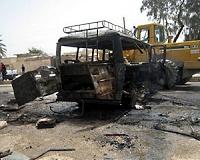| . |  |
. |
Baghdad (AFP) June 18, 2010 Iraq's two main contenders to head a new government remained at odds over any compromise on Friday, denting US hopes that three days of talks by a top envoy had advanced the prospects of a deal. The persistent political vacuum three and a half months after a general election which gave no bloc the necessary majority to form a new administration has caused mounting concern in Washington as it prepares to withdraw its remaining 38,000 combat troops by the end of August. Former prime minister Iyad al-Allawi, whose list won the largest number of seats in the March 7 election, dismissed as simplistic suggestions he forgo what he sees as his constitutional right to have first go at forming a government in the interests of breaking the deadlock. Incumbent Nuri al-Maliki, whose bloc came second, in turn rejected proposals that he surrender some of the powers of the premiership as part of a national unity deal, warning that a feeble government would be a recipe for civil war. Washington has been pressing for a coalition agreement that embraces all of Iraq's main political blocs for fear that the exclusion of any faction among the country's divided Shiite, Sunni Arab and Kurdish communities might spark a new upsurge in violence. US Assistant Secretary of State for Near Eastern Affairs Jeffrey Feltman held talks with all of Iraq's main political leaders between Tuesday and Thursday in a bid to promote an inclusive deal. "I don't think there is going to be a breakthrough immediately," a senior US diplomat acknowledged. "But the fact is that all sides are talking and the one thing that they are agreed on is that there has to be a government where Sunnis, Shias and Kurds all play a significant role," the diplomat told AFP on Friday. "We are extremely confident that all three blocs are going to have a major role in the government," he added, asking not to be identified. Maliki's Shiite-led State of Law alliance has done a deal with the main Shiite religious bloc to form a new parliamentary grouping larger than Allawi's, but it remains four seats short of an overall majority. Its strongly Shiite flavour has only increased the importance of an agreement with Allawi, whose Iraqiya bloc swept Sunni Arab provinces which have been the heartland of the anti-US insurgency amid fears that its exclusion might further stoke the sense of political disenfranchisement among its voters. Allawi and Maliki held their first head-to-head talks last Saturday which they described as "cordial," but in separate interviews released on Friday they remained poles apart. In an interview with The Times of London, Maliki rejected any compromise involving a collegiate premiership with a prime minister and deputy prime ministers sharing powers. "Some people want a traffic cop for this job, one whom nobody obeys," Maliki told daily. "A state cannot be run like that," said the incumbent premier who has made his political reputation out of taking a strong hand to both Sunni insurgents and Shiite militias. "A feeble government would take Iraq back into sectarian war... Without a powerful state, militias and gangs will reappear." But asked by CNN whether he was prepared to step aside to pave the way for a deal with Maliki, Allawi said: "The issue is much more complex than this. It is very unfortunate that people are trying to simplify things." Asked what that meant for the prospects of an agreement, he told CNN: "I think we are still far away from this." MPs in Allawi's bloc said they had insisted on his right to be the new prime minister in their talks with Feltman. "During the meeting, we confirmed our commitment to the constitutional right to form the government," Hussein al-Shaalan told AFP. Pro-Maliki MP Abbas al-Bayati said the US envoy had stressed Washington's desire to see a government of national unity, but had not commented about who was entitled to lead it. "He did not speak about the legitimacy of any party, and did not mention the right of any party to form a government," Bayati told AFP. "He spoke of the need to speed up an agreement between the political blocs." For Washington the urgency is now becoming pressing as it prepares to reduce its forces by 38,000 combat troops in little more than two and a half months, leaving just 50,000 soldiers behind. Feltman himself acknowledged in a YouTube posting before his visit that it threatens to be an "incredibly complicated logistical exercise."
Share This Article With Planet Earth
Related Links Iraq: The first technology war of the 21st century
 Five killed in Iraq attacks
Five killed in Iraq attacksBaghdad (AFP) June 14, 2010 Attacks across Iraq claimed the lives of five people on Monday, including a police colonel who was killed by a bomb in the south of the capital, security officials said. The senior officer had been on board a police convoy targeted by a bomb in the Dura district of Baghdad. Another policeman was also killed and three more were wounded, officials in the interior ministry said. Police were ... read more |
|
| The content herein, unless otherwise known to be public domain, are Copyright 1995-2010 - SpaceDaily. AFP and UPI Wire Stories are copyright Agence France-Presse and United Press International. ESA Portal Reports are copyright European Space Agency. All NASA sourced material is public domain. Additional copyrights may apply in whole or part to other bona fide parties. Advertising does not imply endorsement,agreement or approval of any opinions, statements or information provided by SpaceDaily on any Web page published or hosted by SpaceDaily. Privacy Statement |